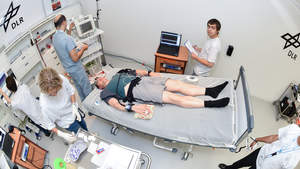KFAR SABA, ISRAEL--(Marketwired - Jul 1, 2015) - Ornim Medical, Inc., a biomedical technology company pioneering noninvasive patient monitoring solutions for cerebral and tissue blood flow, announced today that the National Space Biomedical Research Institute (NSBRI) has incorporated Ornim's c-FLOW™ monitor, the only standalone non-invasive, continuous, real-time cerebral blood flow monitor, into a study to investigate the influence of simulated spaceflight conditions on brain physiology. The NSBRI is partnering with a team of American neurologists and scientists to conduct the study at :envihab, a newly-built specialized facility of the German Aerospace Center (DLR), located in Cologne, Germany.
The DLR's Institute of Aerospace Medicine is overseeing the study, which examines how the human brain adapts to increased levels of fluid inside the skull in combination with elevated carbon dioxide levels. These conditions may be experienced by astronauts living and working on board the International Space Station (ISS) and could be implicated in the vision changes that some astronauts have experienced during spaceflight. The study also has implications for people on Earth who suffer from brain disorders, including elevated pressure on the brain.
Dr. Rupert Gerzer, Director of the DLR's Institute of Aerospace Medicine, declared, "I am thrilled with this collaborative project that focuses on a real 'space syndrome' that must be understood and solved before we can send humans to space for really long missions beyond Earth. This project is also a breakthrough as a novel way of using a unique 'terrestrial analog to the ISS', :envihab, in joint international studies that focus on important health challenges of astronauts as well as of patients on Earth."
Initiated in mid-June and running through July 1, the study includes six healthy middle-aged men as subjects and employs c-FLOW brain flow monitor, along with other medical devices capable of monitoring brain physiology. The study results will be published via a series of scientific papers, and the lessons learned from the study will be presented to the international space medicine community at conferences.
"We are very excited about the inclusion of the c-FLOW cerebral blood flow monitor in this groundbreaking study, as it is a true testament to the product's treatment versatility," said Israel Schreiber, CEO of Ornim Medical. "We are proud to partner with the NSBRI and look forward to understanding more about how the c-FLOW monitor can help non-invasively minimize treatment complications and improve patient outcomes for both astronauts and patients."
The c-FLOW™ cerebral blood flow monitor is the latest device introduced by Ornim Medical. The monitor provides physicians with real-time data enabling the personalization of therapy for patients with acute ischemic stroke and other forms of brain injury. To learn more about the c-FLOW, please visit www.Ornim.com.
About Ornim Medical
Ornim Medical is a biomedical technology company specializing in research, development, and marketing of the highest quality monitoring devices for cerebral perfusion. Its product, the c-FLOW™, is based on the patented UTLight™ technology and can be used in most areas where cerebral blood flow needs to be monitored.
Ornim Medical provides physicians with the most advanced monitoring tools to help direct safe and decisive patient care when the perfusion of vital tissue is at stake. The use of the c-FLOW (depending on the clinical setting) provides physicians with critical information needed to understand perfusion, helping direct treatment and lower the cost of patient care.
Ornim Medical's patented UTLight technology employs the combination of light and ultrasound to provide a noninvasive measure of blood flow. UTLight technology is unique among all other commercially available NIRS technologies, since it also analyzes the light speckle signal and does not rely solely on the intensity of light reaching the detector.
Ornim Medical's unique technology is protected by 15 granted worldwide patents.
About NSBRI
Established in 1997 through a NASA competition, NSBRI is headquartered at Baylor College of Medicine, in the Texas Medical Center and is a consortium of twelve leading biomedical institutions. NSBRI, a 501(c) (3) organization partnered with NASA, is studying the health risks related to long-duration spaceflight and developing the technologies and countermeasures needed for human space exploration missions. The Institute's science, technology and career development projects take place at approximately 60 institutions across the United States. For more information, please visit www.nsbri.org. The Industry Forum engages the private sector to develop medical products for both space and Earth through commercialization activities and seed funding. Find out more at www.NSBRIforum.org and follow the NSBRI Industry Forum on Twitter and Facebook.
About DLR
DLR (German Aerospace Center) is the national aeronautics and space research center of the Federal Republic of Germany. Its extensive research and development work in aeronautics, space, energy, transport and security is integrated into national and international cooperative ventures. In addition to its own research, as Germany's space agency, DLR has been given responsibility by the federal government for the planning and implementation of the German space program. DLR is also the umbrella organization for the nation's largest project management agency. DLR has approximately 8000 employees at 16 locations in Germany: Cologne (headquarters), Augsburg, Berlin, Bonn, Braunschweig, Bremen, Goettingen, Hamburg, Juelich, Lampoldshausen, Neustrelitz, Oberpfaffenhofen, Stade, Stuttgart, Trauen, and Weilheim. DLR also has offices in Brussels, Paris, Tokyo and Washington D.C.
DLR's mission comprises the exploration of Earth and the Solar System and research for protecting the environment. This includes the development of environment-friendly technologies for energy supply and future mobility, as well as for communications and security. DLR's research portfolio ranges from fundamental research to the development of products for tomorrow. In this way, DLR contributes the scientific and technical expertise that it has acquired to the enhancement of Germany as a location for industry and technology. DLR operates major research facilities for its own projects and as a service for clients and partners. It also fosters the development of the next generation of researchers, provides expert advisory services to government and is a driving force in the regions where its facilities are located.
Contact Information:
For media inquiries, please contact
Glenn Silver
Lazar Partners
+1-646-871-8485
gsilver@lazarpartners.com
